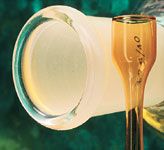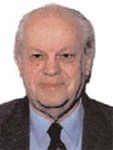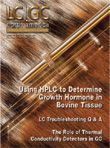Chromatography and the Cold War
LCGC North America
This postscript to the December 2005 installment "Early Petroleum Chromatographers" outlines the East–West controversy concerning the invention of chromatography.
This postscript to the December 2005 installment "Early Petroleum Chromatographers" outlines the East–West controversy concerning the invention of chromatography.
In the December issue of LCGC, I discussed the activities of D.T. Day around 1900, which can be considered as a forerunner of chromatography (1). I also mentioned the correct evaluation of his work by L. Zechmeister, one of the true pioneers of (classical) liquid chromatography (2,3) and the unexpected polemics initiated by two British scientists, Herbert Weil and Trevor I. Williams, who challenged Zechmeister's evaluation and declared — albeit, incorrectly — Day and not Twett as the "true inventor of chromatography" (4,5). The short papers dealing with this controversy were published in a widely read international journal and, thus, were available to a large audience. However, it is not known that these polemics also induced a political reaction from the other side of the Iron Curtain, as part of the accelerating Cold War.

I learned about this controversy about 30 years ago when I was browsing in the R.A. Millikan Library of California Institute of Technology (Caltech), Pasadena, looking for information about Zechmeister, who, from 1940 until his death in 1972, had been associated with this school as a distinguished professor. In the library, I found a large box containing some of Zechmeister's files and in it, the typewritten translation of two Russian papers from 1951 related to this controversy. Apparently, Zechmeister heard about these papers after their publication and had them translated. However, according to my best knowledge, he never publicly discussed their content: probably he was just smiling when reading this manifestation of human stupidity.

Leslie S. Ettre
In a detailed scholarly discussion of the activities of early petroleum chromatographers 10 years ago (6), I mentioned this controversy. However, I believe that the recent discussion of Day's activities warrants a repeat of this anomaly of pseudoscience. Fortunately, this is now in the past and belongs to the wastebasket of human history. Still, it is a good illustration of how a scientific discussion can deteriorate if political motives became involved.
To help readers understand the atmosphere of the period over 50 years ago, I have to give a brief summary of the events in the decade following World War II.
Realignment in Eastern Europe
The victory over Germany, their success against great odds after immense sacrifices and losses, resulted in understandable pride among the peoples of the Soviet Union. This feeling was exploited by their leaders and intensive propaganda was initiated, using the victory as a sign of the superiority of their political system. This campaign also was extended to all other areas of life and the victory was considered as proof of the superiority of the Russian people over "Western Capitalist–Imperialist" society. Suddenly, past accomplishments of the Czarist Empire — until then condemned — were resurrected and considered as part of an unbroken tradition, and even minor advances were blown up to sound at least equal or even superior to Western achievements.
This propaganda also had a second aim. At the end of World War II, the Soviet Union acquired a vast territory on its western borders, occupying a number of countries that, for centuries, belonged to the western world and were part of western culture and civilization. By incorporating them into their empire, the Soviet leaders wanted to prove that their system and culture is superior, and that past and present achievements of Russia and the Soviet Union surpassed those of the decadent West.
The Cold War further intensified this attitude. Besides the dangerous potential military confrontations, the Soviet leaders became extremely sensitive to any statement that, in their opinion, tried to belittle their achievements. Even harmless remarks were interpreted as deliberate provocation against the Soviet Union.
Chromatography, a technique invented in Russia by M.S. Tswett, could not stay immune to this trend and even slight comments on the contribution of others were looked upon with suspicion, as deliberate attempts to question Russia's (that is, the Soviet Union's) achievements in science.
The polemics between Zechmeister, Weil, and Williams seemed to prove to them that their fear was valid: representatives of the bourgeois West again were trying to steal a Russian invention.
Reaction in the Soviet Union
The issues of Nature were read in the Soviet Union, and, quite unexpectedly, the two polemic articles of Weil and Williams (4,5) initiated a quick answer from Moscow: two Russian scientists, Kh.S. Koshtoyants and K.F. Kalmikov, published a three-page-long article in the Russian journal Biokhimiya (7). In this article, they defended Tswett's priority, but in a relatively objective summary of his work. But, of course, this alone would not satisfy the obligatory trend of referring to even earlier Russian scientific work, demonstrating that their country was way ahead of everyone generations earlier. Therefore, they stated that actually, a Russian scientist in 1786 (more than a century before anybody!) had separated substances from solution by adsorption. In addition, they also cited S.K. Kvitka, a Russian petroleum engineer, who on June 17, 1900 (two weeks before Day's lecture at the First World Petroleum Congress, in Paris), was supposed to have submitted a report to the Technical Committee in Baku (the center of Russia's oil production) and in it, he "correctly interpreted" the process of separation by adsorption.
Of course, the references in the article of Koshtoyants and Kalmikov were untraceable; but still, the language of their article was within the norms of scientific publications. However, apparently, the editors of Biokhimiya did not consider it politically correct enough, and therefore, as an introduction to the article, they added a strong editorial entitled "Questions of Priority of Native Biochemistry," signed by the Editorial Board (8). In this, they referred to the existence of a "Western plot" aiming "to disparage the achievement of advanced science in the progressive countries" (that is, the Soviet Union). Next, they stated that "the facts concerning the concealment of the research of Soviet scientists . . . by the authors of bourgeois countries (particularly the USA) take on such a systematic nature that they leave no doubt of the premeditation of this phenomenon" and concluded that "a demonstrative example of the nature of such an attempt is the rather cunning contrivance of certain 'pseudo-historians' with regards to such an indisputable and extremely important achievement of Russian science as the creation of the basis of the chromatographic method by M.S. Tswett."
Most likely, the editors of the journal never read the questioned articles in Nature, which were written by British and not American scientists, and certainly did not know anything about the original articles of Zechmeister, an American scientist, who actually defended Tswett's priority. Mentioning this would have been contrary to the official anti-American policy and, thus, they considered it best to ignore it.
This official Russian reaction made Mikhail Tswett, born in Italy and educated in Switzerland, a truly cosmopolitan scientist, who in his life faced discrimination in Russia by the stratified science establishment because of his foreign background, and who actually carried out his work in (Russian-occupied) Poland, suddenly a native of Russia (which he was not) and a symbol of the superiority of Russian (and, hence, Soviet) science.
The discussion of early petroleum chromatographers was published as an installment of the "Milestones in Chromatography" series. With the present report, we could start a new series titled "Milestones in Human Stupidity."
Leslie S. Ettre From 1988 to 2004, "Milestones in Chromatography" editor Leslie S. Ettre was associated with the Chemical Engineering Department of Yale University (New Haven, Connecticut), first as an adjunct professor and then as a research fellow. Previously, he had been with the Perkin-Elmer Corporation for 30 years. He is currently a member of LCGC's editorial advisory board. Direct correspondence about this column to "Milestones in Chromatography,"LCGC, Woodbridge Corporate Plaza, 485 Route 1 South, Building F, First Floor, Iselin, NJ 08830, e-mail lcgcedit@lcgcmag.com
References
(1) L.S. Ettre, LCGC 23(12), 1274–1280 (2005).
(2) L. Zechmeister, Ann. N.Y. Acad. Sci. 49, 145–160 (1948).
(3) L. Zechmeister, Progress in Chromatography 1938–1947 (Chapman & Hall, London, U.K., 1950), p. 3.
(4) H. Weil and T.I. Williams, Nature (London) 166, 1000–1001 (1950).
(5) H. Weil and T.I. Williams, Nature (London) 167, 906–907 (1951).
(6) L.S. Ettre, Chromatographia 40, 207–218 (1995).
(7) Kh.S. Koshtoyants and K.F. Kalmikov, Biokhimiya 16, 479–481 (1951).
(8) Editorial Board, Biokhimiya 16, 478 (1951).

Determining the Link Between Prenatal Cannabis Use and Symptoms of Depression Using LC–MS/MS
April 16th 2025Researchers investigating the relationship between cannabis use during pregnancy and depressive symptoms—and whether continued use beyond the first trimester or higher levels of use were linked to increased symptoms—used liquid chromatography–tandem mass spectrometry (LC–MS/MS) to confirm the presence of 11-nor-9-carboxy-delta-9-tetrahydrocannabinol (THC-COOH) in urine samples.
Miniaturized GC–MS Method for BVOC Analysis of Spanish Trees
April 16th 2025University of Valladolid scientists used a miniaturized method for analyzing biogenic volatile organic compounds (BVOCs) emitted by tree species, using headspace solid-phase microextraction coupled with gas chromatography and quadrupole time-of-flight mass spectrometry (HS-SPME-GC–QTOF-MS) has been developed.













